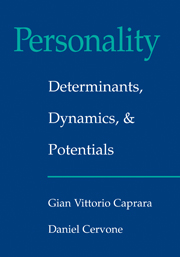Book contents
- Frontmatter
- Contents
- Preface
- PART ONE INTRODUCTION TO PERSONALITY PSYCHOLOGY
- Prologue: Personality Psychology as an Integrative Discipline
- 1 The Domain of Personality Psychology
- 2 Origins, History, and Progress
- PART TWO DESCRIPTION AND EXPLANATION
- PART THREE THE DEVELOPMENT OF PERSONALITY
- PART FOUR THE DYNAMICS OF PERSONALITY
- PART FIVE EPILOGUE
- References
- Author Index
- Subject Index
1 - The Domain of Personality Psychology
Published online by Cambridge University Press: 04 February 2011
- Frontmatter
- Contents
- Preface
- PART ONE INTRODUCTION TO PERSONALITY PSYCHOLOGY
- Prologue: Personality Psychology as an Integrative Discipline
- 1 The Domain of Personality Psychology
- 2 Origins, History, and Progress
- PART TWO DESCRIPTION AND EXPLANATION
- PART THREE THE DEVELOPMENT OF PERSONALITY
- PART FOUR THE DYNAMICS OF PERSONALITY
- PART FIVE EPILOGUE
- References
- Author Index
- Subject Index
Summary
Personality psychology's history is a contentious one. In different eras, the merits of alternative world views, scientific methods, and psychological theories have been fiercely debated. To the present day, personality psychology can be profitably studied as a collection of competing theories, as the discipline's textbooks and college courses commonly attest.
Three factors in particular have fanned the flames of debate. The first is the diversity of philosophical traditions that are precursors to contemporary theory. Current psychological beliefs and practices have long, disparate philosophical roots. We consider the foundations of the contemporary field in detail in chapter 2.
The second factor is the difficulty of defining the field's object of study. Several ideas appear, alone and in combination, in the modern use of the word personality. These ideas include human being, person, the quality or fact of being a person, the quality or fact of being a particular person, individuality, patterns of habit, biophysical and mental activities that express themselves in qualities and habits, the sum of such qualities as they impress themselves on other persons, factors that make an individual conspicuously different from others, and attributes or dimensions according to which all individuals can be compared. Definitions, explicit and implicit, guide theory and inquiry. Divergent definitions foster debate. When the divergent definitions are acknowledged only implicitly, debate is particularly difficult to resolve. Progress can be slow when a field's “terminology alone is a mass of ambiguities” (Harré, 1998, p. 1).
- Type
- Chapter
- Information
- Personality: Determinants, Dynamics, and Potentials , pp. 8 - 23Publisher: Cambridge University PressPrint publication year: 2000

